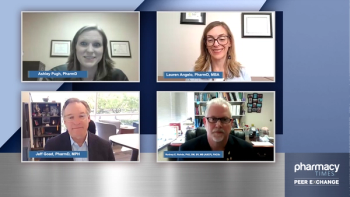
Panelists compare the currently available RSV vaccines for adults, considering their target populations, dosing, and administration to prevent RSV infection.

Panelists compare the currently available RSV vaccines for adults, considering their target populations, dosing, and administration to prevent RSV infection.

Rodney E. Rohde, PhD, SM, SV, MB (ASCP), FACSc, leads a discussion on contraindications for vaccination, such as severe allergic reaction history, acute illness with or without fever, and the optimal timing for vaccination during pregnancy.

Lauren Angelo, PharmD, MBA addresses major factors contributing to vaccine hesitancy, including lack of healthcare provider recommendation and the vaccine's novelty, and provides guidance on counseling patients who are interested in the vaccine but uncertain about its safety and efficacy.

Jeff Goad, PharmD, MPH, stresses the significance of transparency in fostering vaccine confidence by underscoring the ongoing monitoring of vaccines as a means to increase public trust.

The panelists define vaccine fatigue and identify its primary causes as confusing messaging and the high number of annual vaccinations suggested, emphasizing that the most effective way to combat this fatigue is by tailoring the vaccine information and recommendations to the individual patient's specific needs.

Medical professionals explore social determinants of health, including access to and quality of health care, information sources, community context, and built environment, while also examining the influence of race, ethnicity, language on these factors.

Lauren Angelo, PharmD, MBA, acknowledges the progress made in RSV vaccinations but emphasizes the persistent need to educate at-risk patients about the advantages of vaccination, citing data indicating that many patients are willing to get vaccinated but may require encouragement, and concurs that the lack of physician referral remains a crucial barrier to improving vaccination rates among high-risk groups.

The panelists address the challenges of administering multiple vaccines to eligible patients, while also discussing the timing and compatibility of administering certain vaccines simultaneously. They emphasize the importance of being receptive to patient concerns and providing guidance on childhood vaccinations for hesitant individuals.

Medical experts highlight the importance of clinical decision-making and the pivotal role pharmacies play in initiating conversations and identifying high-risk patients during consultations for new medications.

The panelists provide guidance on how pharmacists should advise patients on recognizing RSV symptoms that require urgent medical attention.

Rodney E. Rohde, PhD, SM, SV, MB (ASCP), FACSc, guides a conversation on patient education materials, recommending resources from the American Pharmacists Association, the Centers for Disease Control and Prevention, and the Advisory Committee on Immunization Practices, which provide tools to inform the public about vaccine-preventable diseases.

Medical professionals discuss the ongoing requirements in RSV treatment and vaccination, stressing the importance of at-risk populations maintaining hand hygiene, staying home when sick, and avoiding large crowds during peak seasons to minimize transmission, while also exploring the use of combination tests, panel testing, and rapid testing for RSV diagnosis.

The key opinion leaders examine the current prevalence of RSV infections and its evolution over time, analyzing the seasonal patterns of RSV outbreaks in the United States and identifying the demographic groups most vulnerable to RSV infections.

The panel concludes by sharing their insights and expressing their aspirations for future developments and improvements in RSV vaccination efforts.